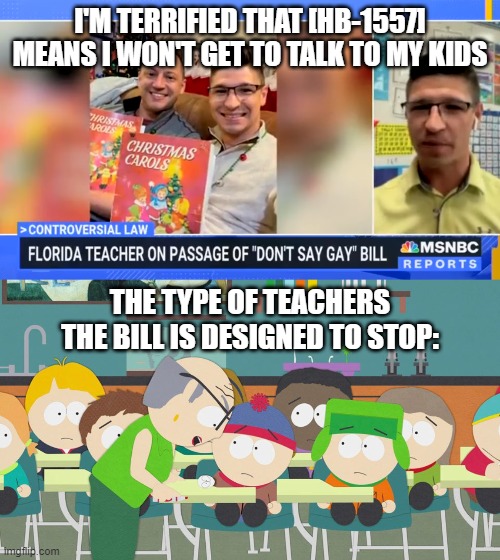Imagine a world where your child’s classroom discussions are not only shaped by the curriculum, but also by an intricate web of legal constraints, leaving you wondering if their teacher can even acknowledge the complexities of human relationships. This is the reality unfolding in Florida, ignited by the controversial “Parental Rights in Education” bill, commonly referred to as the “Don’t Say Gay” bill. This legislation has ignited a firestorm of debate, pitting parental rights against LGBTQ+ inclusivity in schools.

Image: imgflip.com
This article delves into the heart of the “Parental Rights in Education” bill, dissecting its contents, exploring its impact on schools and families, and analyzing the arguments surrounding its implications for LGBTQ+ students and their allies. Understanding the nuances of this legislation is crucial for navigating the evolving landscape of education in Florida and beyond, fostering open dialogue, and advocating for the well-being of all children.
What is the “Parental Rights in Education” Bill?
The “Parental Rights in Education” bill (HB 1557) was signed into law by Florida Governor Ron DeSantis in March 2022. The bill, which went into effect on July 1st, 2022, has been widely criticized for its broad language and potential impact on LGBTQ+ students. Here’s a breakdown of some of the key provisions:
- Classroom Instruction on Sexual Orientation and Gender Identity: The bill restricts classroom instruction on sexual orientation and gender identity “in kindergarten through grade 3.” This provision effectively bans the discussion of LGBTQ+ topics in early elementary classrooms.
- Parental Notification and Opt-Out Option: The bill mandates that parents must be notified about any changes to their child’s “services, activities, and/or counseling” related to sexual orientation or gender identity. It also allows parents to opt their children out of instruction or activities related to these topics.
- Private Cause of Action: This provision empowers parents to sue school districts and their employees for violating the bill’s provisions.
The Debate Over the “Don’t Say Gay” Bill:
The “Parental Rights in Education” bill has been met with fierce opposition, primarily from LGBTQ+ advocates, educators, and civil rights organizations. Critics argue that the bill:
- Discriminates Against LGBTQ+ Students: They contend that the bill sends a message of exclusion and creates a hostile environment for LGBTQ+ students, who may feel silenced and invisible.
- Censors Teachers: Proponents argue that the bill infringes on educators’ ability to provide a comprehensive and inclusive curriculum, potentially hindering LGBTQ+ students’ access to critical resources and support systems.
- Promotes a Narrow View of Family Values: Critics see the bill as reflecting a conservative agenda that prioritizes a particular version of “family values,” excluding LGBTQ+ families and their experiences.
- Undermines Age-Appropriate Discussions: They argue that the bill’s vague language hinders educators’ ability to address issues related to sexuality and gender identity in an age-appropriate and developmentally sensitive manner.
Supporters of the bill, including many conservative lawmakers and parents, counter that:
- Parental Rights are Paramount: They argue that parents have the right to be involved in their children’s education and to determine what their children are exposed to, especially in sensitive areas like sexual orientation and gender identity.
- Protecting Children’s Innocence: Supporters believe that discussing LGBTQ+ issues in elementary schools is inappropriate and can be potentially harmful to young children.
- Focus on Core Curriculum: They contend that the bill ensures that schools focus on core subjects like reading, math, and science, rather than divisive topics that have no place in early elementary classrooms.
The Legal Battles and Consequences:
The “Don’t Say Gay” bill has sparked a wave of legal challenges. The ACLU (American Civil Liberties Union) and other organizations filed lawsuits arguing that the law violates the First Amendment rights of students and teachers, as well as the Equal Protection Clause of the Fourteenth Amendment. These lawsuits are currently making their way through the courts, with significant implications for the future of LGBTQ+ rights in education.
Beyond legal battles, the bill has also had a profound impact on the educational climate in Florida. Teachers and schools are grappling with navigating the new regulations, fearing potential repercussions for their actions. The ambiguity of the language in the bill has led to self-censorship, with some educators reluctant to discuss topics that could be interpreted as relating to sexual orientation or gender identity, even in appropriate contexts.

Image: dailycitizen.focusonthefamily.com
Beyond the Classroom:
The “Don’t Say Gay” bill extends beyond school walls, shaping the social landscape in Florida. LGBTQ+ individuals and their allies have reported feeling increasingly targeted and marginalized due to the bill’s messaging. Some have felt pressure to remain silent about their identities, fearing backlash or discrimination. The bill has contributed to an environment of fear and uncertainty for many in the LGBTQ+ community.
Parental Rights In Education Bill Full Text Florida
Looking Ahead:
The “Don’t Say Gay” bill has undoubtedly ignited a national conversation about the role of education in shaping societal values and protecting the rights of all individuals. The debate surrounding this legislation is likely to continue, as the legal challenges and its impact on education and society unfold. This issue demands careful consideration and thoughtful dialogue, seeking to understand the experiences and perspectives of all parties involved. It is essential to promote inclusivity and ensure that all students feel safe and respected in their learning environments, regardless of their sexual orientation or gender identity.
As we move forward, it is crucial to stay informed, engage in respectful discourse, and advocate for policies that promote equity and opportunity for all. The “Don’t Say Gay” bill serves as a stark reminder of the importance of safeguarding the rights of LGBTQ+ individuals and creating schools that truly embrace the diversity of human experiences. Understanding and addressing these complex issues is vital for shaping a more just and inclusive society for all children.






